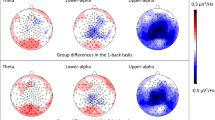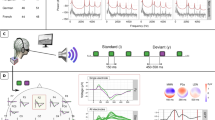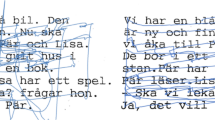Abstract
THE purposes of the experiment were to search for spectral features for identifying dyslexic children, to demonstrate the statistical significance of any such features, and to start a data base that could ultimately result in a reliable discriminant function for the early detection of reading disabilities.
This is a preview of subscription content, access via your institution
Access options
Subscribe to this journal
Receive 51 print issues and online access
$199.00 per year
only $3.90 per issue
Buy this article
- Purchase on Springer Link
- Instant access to full article PDF
Prices may be subject to local taxes which are calculated during checkout
Similar content being viewed by others
References
Jasper, H. H., Electroenceph. Clin. Neurophysiol., 10, 371 (1958).
Dixon, W. J., Biomedical Computer Programs (University of California Press, Berkeley, 1970).
Walter, D. O., Rhodes, J. M., and Adey, W. R., Electroenceph. Clin. Neurophysiol., 22, 22 (1967).
Gardiner, M. F., PhD dissertation, University of California (1969).
Author information
Authors and Affiliations
Rights and permissions
About this article
Cite this article
SKLAR, B., HANLEY, J. & SIMMONS, W. An EEG Experiment Aimed Toward Identifying Dyslexic Children. Nature 240, 414–416 (1972). https://doi.org/10.1038/240414a0
Received:
Revised:
Issue Date:
DOI: https://doi.org/10.1038/240414a0
This article is cited by
-
Neural connectivity in Internet gaming disorder and alcohol use disorder: A resting-state EEG coherence study
Scientific Reports (2017)
-
A role of CB1R in inducing θ-rhythm coordination between the gustatory and gastrointestinal insula
Scientific Reports (2016)
-
Time–Frequency Modulation of ERD and EEG Coherence in Robot-Assisted Hand Performance
Brain Topography (2015)
-
EEG correlates of cognitive impairment in MS
The Italian Journal of Neurological Sciences (1998)
-
Calculation of event-related coherence?A new method to study short-lasting coupling between brain areas
Brain Topography (1994)
Comments
By submitting a comment you agree to abide by our Terms and Community Guidelines. If you find something abusive or that does not comply with our terms or guidelines please flag it as inappropriate.



